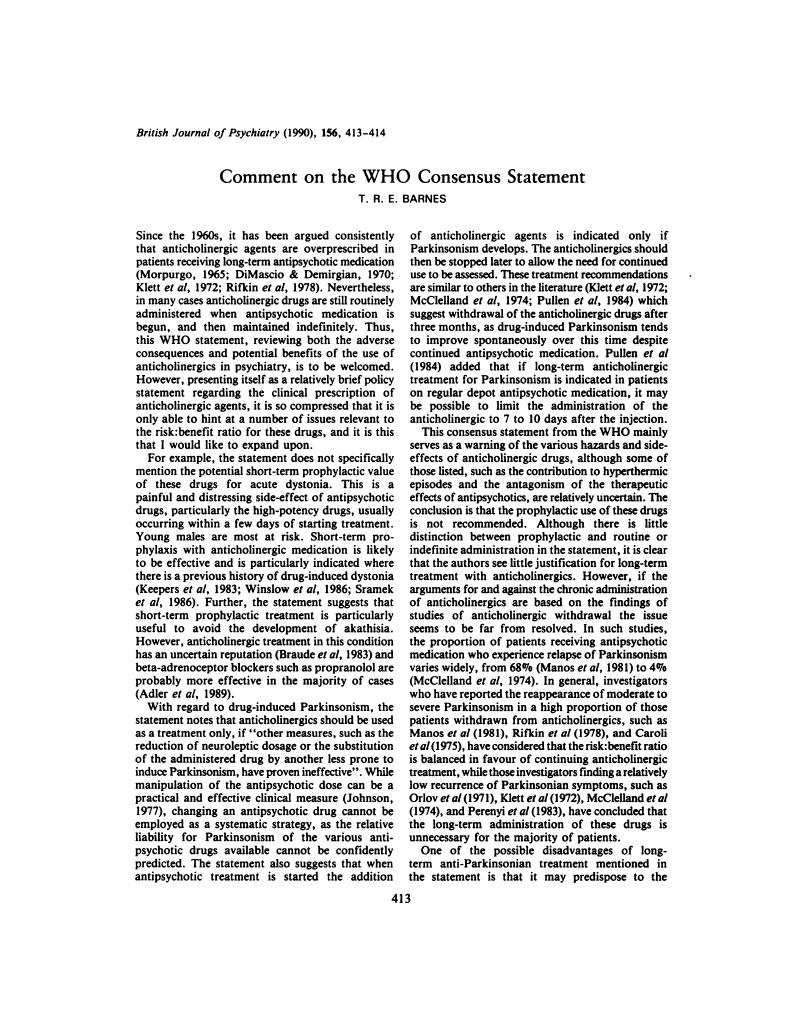Crossref Citations
This article has been cited by the following publications. This list is generated based on data provided by Crossref.
Almeida, Joyce H.
1991.
Neuroleptic side‐effects—the “rabbit syndrome”.
International Journal of Geriatric Psychiatry,
Vol. 6,
Issue. 7,
p.
537.
Kissling, W.
Kane, J. M.
Barnes, T. R. E.
Dencker, S. J.
Fleischhacker, W. W.
Goldstein, M. J.
Johnson, D. A. W.
Marder, S. R.
Müller-Spahn, F.
Tegeler, J.
Wistedt, B.
and
Woggon, B.
1991.
Guidelines for Neuroleptic Relapse Prevention in Schizophrenia.
p.
155.
1992.
Tardive Dyskinesia: A Task Force Report of the American Psychiatric Association.
p.
61.
Dose, M.
1993.
Therapieresistenz unter Neuroleptikabehandlung.
p.
139.
Double, D. B.
Warren, G. C.
Evans, M.
and
Rowlands, R. P.
1993.
Efficacy of maintenance use of anticholinergic agents.
Acta Psychiatrica Scandinavica,
Vol. 88,
Issue. 5,
p.
381.
Siris, Samuel G.
1993.
Adjunctive Medication in the Maintenance Treatment of Schizophrenia and its Conceptual Implications.
British Journal of Psychiatry,
Vol. 163,
Issue. S22,
p.
66.
Bezchlibnyk-Butler, Kalyna Z.
and
Remington, Gary J.
1994.
Antiparkinsonian Drugs in the Treatment of Neuroleptic-Induced Extrapyramidal Symptoms.
The Canadian Journal of Psychiatry,
Vol. 39,
Issue. 2,
p.
74.
SILVER, HENRY
and
GERAISY, NABIL
1996.
On Prescribing an Antiparkinsonian Drug.
Human Psychopharmacology: Clinical and Experimental,
Vol. 11,
Issue. 6,
p.
517.
Qureshi, Naseem Akhtar
Al Amri, Aladin Hadi
Abdelgadir, Muzamil H.
and
El-Haraka, Essam A.
1997.
Trihexyphenidyl (Artane) Dependence: A Controlled Investigation between Users and Abusers.
Annals of Saudi Medicine,
Vol. 17,
Issue. 2,
p.
185.
Ilchef, Ralf
1997.
Neuroleptic-Induced Laryngeal Dystonia Can Mimic Anaphylaxis.
Australian & New Zealand Journal of Psychiatry,
Vol. 31,
Issue. 6,
p.
877.
UNGVARI, GABOR S.
CHOW, LOK‐YEE
CHIU, HELEN F. K.
NG, FUNG‐SHING
and
LEUNG, AND TONY
1997.
Modifying psychotropic drug prescription patterns:A follow‐up survey.
Psychiatry and Clinical Neurosciences,
Vol. 51,
Issue. 5,
p.
309.
Waddington, John L.
Youssef, Hanafy A.
and
Kinsella, Anthony
1998.
Mortality in schizophrenia.
British Journal of Psychiatry,
Vol. 173,
Issue. 4,
p.
325.
Williams, Justin H. G.
1999.
Audit of anticholinergic treatment in a psychiatric patient population.
Psychiatric Bulletin,
Vol. 23,
Issue. 1,
p.
22.
Ungvari, Gabor S.
Chiu, Helen F. K.
Lam, Linda C. W.
Pang, Alfred H. T.
Chung, Dicky W. S.
Li, Siu-Wah
Chiu, Siu-Ning
Lum, Francis C. K.
and
Leung, Tony
1999.
Gradual Withdrawal of Long-Term Anticholinergic Antiparkinson Medication in Chinese Patients With Chronic Schizophrenia.
Journal of Clinical Psychopharmacology,
Vol. 19,
Issue. 2,
p.
141.
Steele, Jonathan
Duncan, Janice
and
Short, Angela
2000.
An audit of anti-muscarinic drug use at the State Hospital.
Psychiatric Bulletin,
Vol. 24,
Issue. 2,
p.
61.
MASAND, PRAKASH S.
and
GUPTA, SANJAY
2000.
Long-Term Adverse Effects of Novel Antipsychotics.
Journal of Psychiatric Practice,
Vol. 6,
Issue. 6,
p.
299.
Ungvari, Gabor S
Chung, Yiu Gar
Chee, Yip Ka
Fung‐Shing, Ng
Kwong, Tang Wai
and
Chiu, Helen F. K.
2002.
The pharmacological treatment of schizophrenia in Chinese patients: a comparison of prescription patterns between 1996 and 1999.
British Journal of Clinical Pharmacology,
Vol. 54,
Issue. 4,
p.
437.
Whicher, Emma
and
Riley, Jane
2003.
Audit of antipsychotic and anticholinergic prescribing: Leeds CMHT 2000–1.
Psychiatric Bulletin,
Vol. 27,
Issue. 4,
p.
156.
Rosenheck, Robert A.
2005.
Open Forum: Effectiveness Versus Efficacy of Second-Generation Antipsychotics: Haloperidol Without Anticholinergics as a Comparator.
Psychiatric Services,
Vol. 56,
Issue. 1,
p.
85.
Edlinger, Monika
Hausmann, Armand
Kemmler, Georg
Kurz, Martin
Kurzthaler, Ilsemarie
Walch, Thomas
Walpoth, Michaela
and
Wolfgang Fleischhacker, W.
2005.
Trends in the pharmacological treatment of patients with schizophrenia over a 12 year observation period.
Schizophrenia Research,
Vol. 77,
Issue. 1,
p.
25.




eLetters
No eLetters have been published for this article.